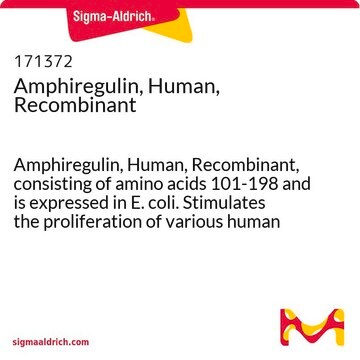A7080
Amphiregulin human
≥97% (SDS-PAGE), recombinant, expressed in E. coli, lyophilized powder, suitable for cell culture
Synonyme(s) :
AREG, CRDGF, SDGF, AR
About This Item
Produits recommandés
product name
Amphiregulin human, recombinant, expressed in E. coli, lyophilized powder, suitable for cell culture, ≥97% (SDS-PAGE)
Source biologique
human
Niveau de qualité
Produit recombinant
expressed in E. coli
Pureté
≥97% (SDS-PAGE)
Forme
lyophilized powder
Puissance
10-100 ng/mL ED50/EC50
Poids mol.
~11 kDa
Conditionnement
pkg of 1 mg
Conditions de stockage
avoid repeated freeze/thaw cycles (Do not store in a frost-free freezer.)
Technique(s)
cell culture | mammalian: suitable
Impuretés
endotoxin, tested
Numéro d'accès UniProt
Température de stockage
−20°C
Informations sur le gène
human ... AREG(374)
Actions biochimiques/physiologiques
Composants
Attention
Forme physique
Notes préparatoires
Remarque sur l'analyse
Code de la classe de stockage
11 - Combustible Solids
Classe de danger pour l'eau (WGK)
WGK 3
Point d'éclair (°F)
Not applicable
Point d'éclair (°C)
Not applicable
Équipement de protection individuelle
Eyeshields, Gloves, type N95 (US)
Certificats d'analyse (COA)
Recherchez un Certificats d'analyse (COA) en saisissant le numéro de lot du produit. Les numéros de lot figurent sur l'étiquette du produit après les mots "Lot" ou "Batch".
Déjà en possession de ce produit ?
Retrouvez la documentation relative aux produits que vous avez récemment achetés dans la Bibliothèque de documents.
Les clients ont également consulté
Notre équipe de scientifiques dispose d'une expérience dans tous les secteurs de la recherche, notamment en sciences de la vie, science des matériaux, synthèse chimique, chromatographie, analyse et dans de nombreux autres domaines..
Contacter notre Service technique










